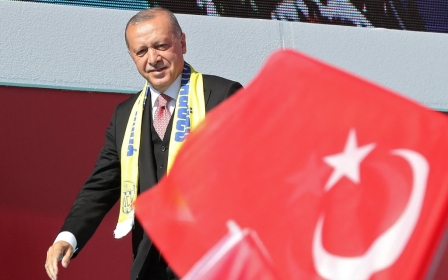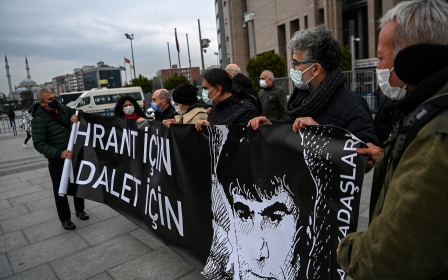Turkey exporters re-routing products to avoid Saudi boycott, say traders
Turkey has been re-routing some exports of food, clothing and other goods in order to avoid an unofficial Saudi blockade that has reduced trade between to the two countries to a record low, according to traders and exports.
The news echoes earlier reporting by Middle East Eye revealing that since October 2020, the Saudi government had been systematically pressuring local businesses not to trade with Turkish companies and to remove Turkish goods from their shelves.
New MEE newsletter: Jerusalem Dispatch
Sign up to get the latest insights and analysis on Israel-Palestine, alongside Turkey Unpacked and other MEE newsletters
According to traders and a diplomat speaking to Reuters, production in nearby countries has allowed exporters to obtain customs documents and remove "Made in Turkey" product tags.
Though the kingdom has never officially acknowledged the boycott, Turkish officials have told MEE that Riyadh ramped up its efforts to target Turkey's economy after a Turkish court’s decision to accept two separate indictments against Saudi officials said to be involved in the murder of journalist Jamal Khashoggi in Istanbul in October 2018.
On Tuesday, two Turkish officials said their country would raise its concerns regarding the boycott at the World Trade Organisation (WTO).
An official agenda released by the WTO has also indicated that Turkey plans to discuss the matter at the Goods Council meeting taking place on 31 March-1 April.
The agenda says Turkey has requested to talk about Saudi Arabia’s “trade restrictive policies and practices”.
Plunging exports
Official trade data from the Turkish Exports Assembly shows that in the first quarter of the year Turkish exports to Saudi Arabia plunged 93 percent on an annual basis to $56m, with the exports of food, electronics, garments, jewellery and automotive goods all down more than 90 percent from the previous year.
"A black market is now emerging where brokers take the Turkish goods to other ports and forge the documents so they appear to be coming from China or Europe for fees," one importer of building materials to Saudi Arabia told Reuters, while requested anonymity.
Another trade company official told Reuters "some companies who rely on Saudi Arabia as a main client re-routed their production lines in order to continue to be able to sell".
Trade data has also shown Turkish garments, textiles, chemicals and jewellery arriving in Oman and Lebanon increasing from 200 percent to 400 percent.
'Finishing touches'
Seref Fayat, head of Turkey's TOBB clothing and garment council, told Reuters that manufacturers were considering sending fabrics to Bulgaria or Serbia, for "finishing touches" on Saudi-bound goods, so that Turkish companies could honour contracts with retail brands which commit them to global deliveries, including to Saudi Arabia.
"Exporters are trying to overcome the blockade, but this means additional costs out of their pocket," he explained.
Turkish exports to Bulgaria and Serbia were up 58 percent and 44 percent respectively in March, according to the data published on Thursday.
According to three traders who spoke to Reuters, large Turkish companies had been holding talks in Saudi Arabia in recent months to reopen trade with the kingdom, but without success.
Turkish President Recep Tayyip Erdogan said earlier in March that Saudi Arabia had requested to buy Turkish armed drones that could be used in Yemen.
Last year, the Saudi government signed a deal with a local company to supply armed drones after getting a technology transfer from a Turkish defence firm, Vestel Karayel. Six drones were expected to be delivered this year.
Yemen’s Houthis declared earlier this year that they shot down a Karayel, which was previously not known to be in service with the Saudi military.
Middle East Eye delivers independent and unrivalled coverage and analysis of the Middle East, North Africa and beyond. To learn more about republishing this content and the associated fees, please fill out this form. More about MEE can be found here.






